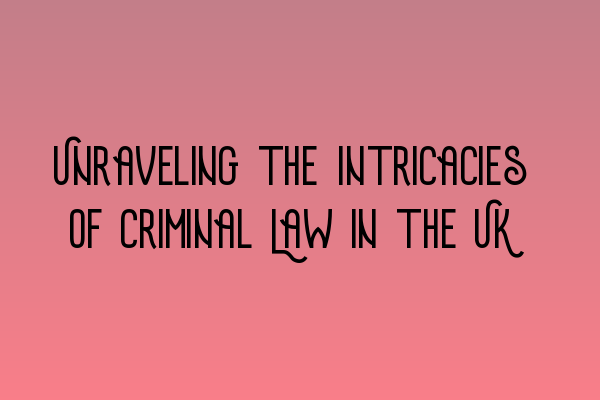Unraveling the Intricacies of Criminal Law in the UK
Welcome to SQE Criminal Law & Practice Law UK! As experienced criminal law solicitors, writers, and SEO experts, we are excited to delve into the intricacies of criminal law in the UK. In this comprehensive blog post, we will guide you through the essential aspects of criminal law, unraveling its complexity and offering valuable insights into this fascinating legal domain.
The Foundation of Criminal Law
Before we dive deeper, let’s establish the foundation of criminal law. Criminal law encompasses the set of rules that define conduct prohibited by the state, imposing penalties on individuals who commit such acts. It encompasses a wide range of offenses, from theft and assault to more serious crimes like murder and fraud.
It is important to understand that criminal law varies between jurisdictions, and our focus here will be on criminal law in the UK. The UK legal system is based on common law principles, with legislation, case law, and legal precedents shaping the way criminal offenses are prosecuted and punished.
For a comprehensive understanding of the intricacies of criminal law, it is crucial to be familiar with the key terms used within this field. Some important keywords to remember include mens rea (mental intention to commit a crime), actus reus (the physical act of committing a crime), and burden of proof (the responsibility to prove guilt beyond a reasonable doubt).
For a deeper exploration of these terms and a solid foundation in criminal law principles, we recommend checking out our comprehensive SQE 1 Preparation Courses. These courses are designed to provide aspiring solicitors with the necessary knowledge and skills to succeed in the legal profession.
The Criminal Justice System in the UK
To navigate the intricacies of criminal law effectively, it is crucial to understand the structure of the criminal justice system in the UK. The system comprises multiple key players, including the police, Crown Prosecution Service (CPS), defense lawyers, judges, and juries.
An important aspect of criminal law in the UK is the principle of innocent until proven guilty. This cornerstone of criminal justice ensures that individuals accused of committing a crime are considered innocent unless there is sufficient evidence to prove their guilt. This principle upholds the fundamental fairness of the legal process.
As aspiring solicitors, it is essential to develop strong advocacy skills to represent clients effectively in criminal proceedings. Our recommended SQE 2 Preparation Courses provide comprehensive training in legal advocacy, enabling you to navigate the complexities of criminal trials with confidence.
Types of Criminal Offenses
Criminal offenses in the UK can be broadly categorized into two main types: summary offenses and indictable offenses. Summary offenses are less serious offenses that are typically tried without a jury in the Magistrates’ Court. Examples of summary offenses include minor assaults, theft, and public order offenses.
Indictable offenses, on the other hand, are more serious crimes that are tried in the Crown Court. These offenses carry higher penalties and often involve complex legal procedures. Examples of indictable offenses include murder, rape, and drug trafficking.
Understanding the classification of offenses is essential for defendants, as it determines the severity of potential punishments and the court where the trial will take place. If you are looking for practice materials to enhance your knowledge of criminal law, we recommend exploring our SQE 1 Practice Mocks FLK1 FLK2. These mock quizzes provide realistic scenarios to test your understanding and application of criminal law principles.
The Role of Solicitors in Criminal Law Cases
Solicitors play a crucial role in criminal law cases, representing clients from the initial stages of investigation through to the trial. They provide legal advice, gather evidence, liaise with other professionals involved, and represent clients in court.
If you aspire to become a criminal law solicitor, it is important to develop a strong understanding of criminal procedure rules, evidence gathering techniques, and effective client communication. Our SRA SQE Exam Dates article provides valuable information on upcoming exam dates and essential resources to help you prepare.
Conclusion
Criminal law in the UK is a complex and fascinating field, requiring a deep understanding of legal principles, structures, and procedures. By unraveling these intricacies, we hope to have provided you with valuable insights into the world of criminal law. Whether you are an aspiring solicitor or simply curious about the legal system, we encourage you to continue exploring our articles and resources to further enhance your knowledge.
